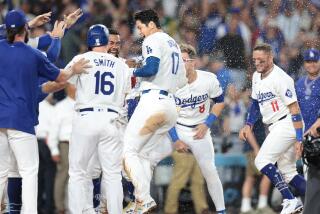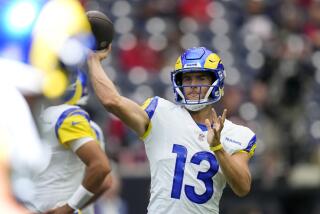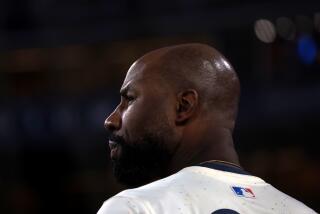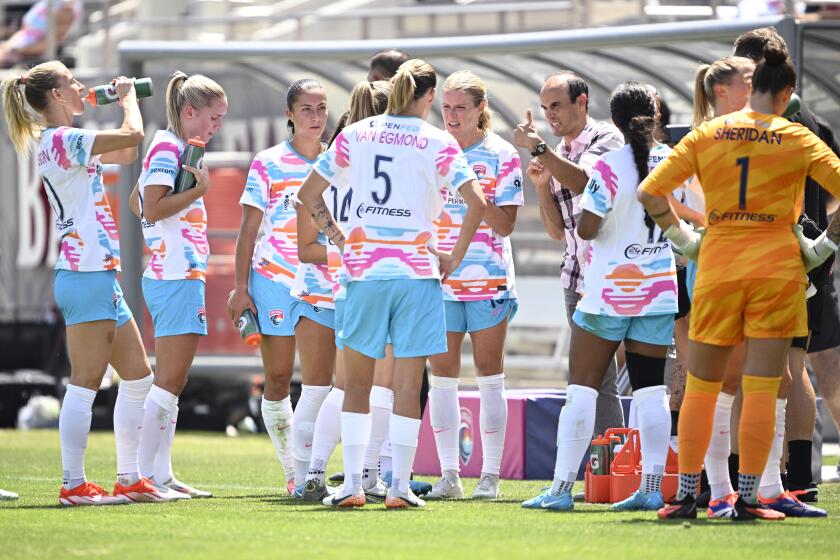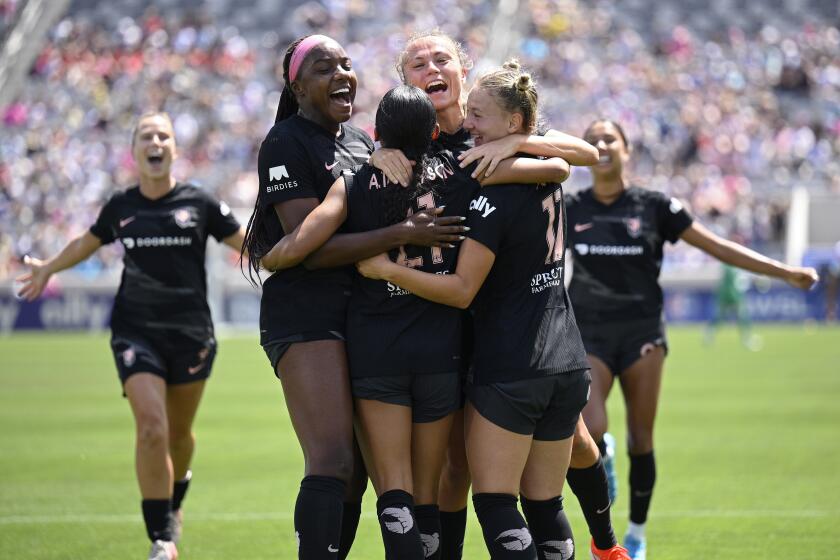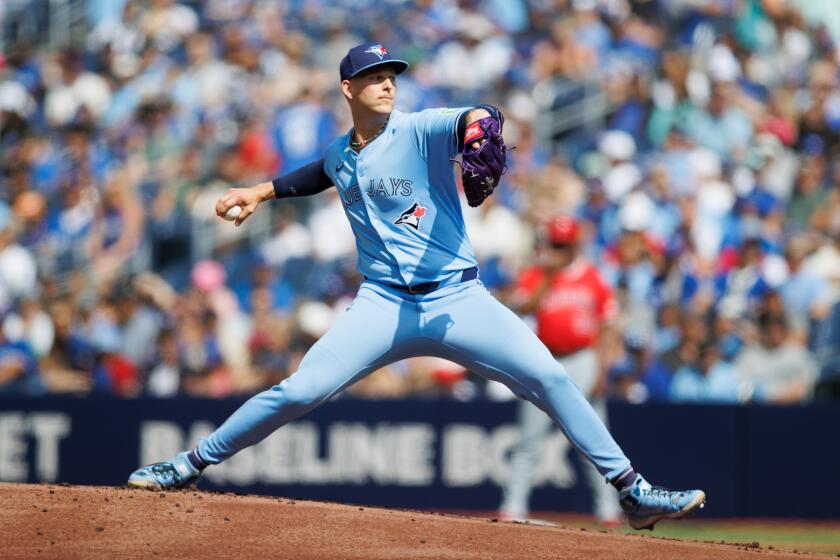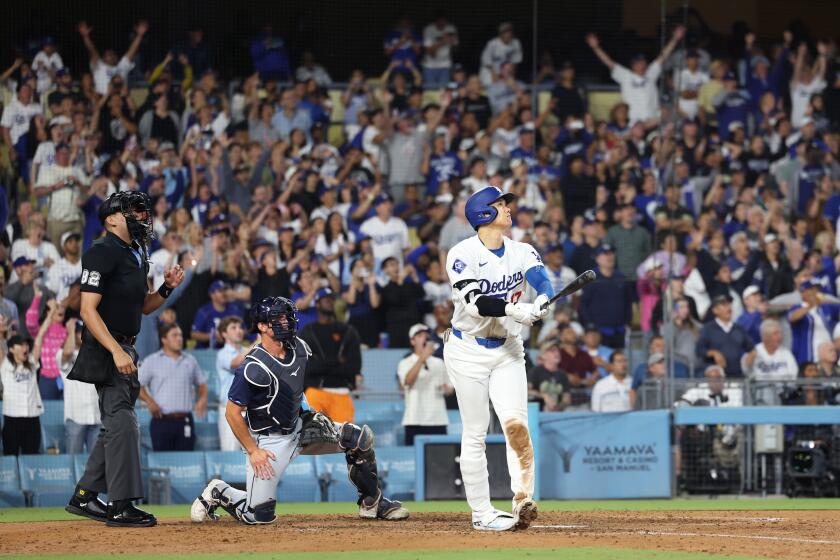Leading Rams Out of the Rain Is His Goal
It never rains in California, but if you coach football in Anaheim and your team goes 5-11, you quickly learn the value of a good hat and slicker.
“I was on the sidelines when we were supposed to be going to the Super Bowl,” says Gil Haskell, Ram assistant to John Robinson, “and instead we went sideways. People laugh at you. They spit at you when you go through the tunnel. They try to drop beer on you.”
Slippery when wet was pretty much the theme of the Rams’ 1990 season, both on the field and on the way to the locker room. And if you don’t like the weather, there are only two ways to change it.
One: “You know how in Catholic school they say, ‘Turn the other cheek?’ ” Haskell says. “Well, I’d have liked to turn my cheek and go right up there and strangle the little . . . who dropped the beer on me.”
Two: Beat up on someone your own size.
Say, the opposing quarterback, for a change.
Haskell: “If you’re a quarterback back there, if you’ve been Joe Montana for the past eight years, you say, ‘I want to play the Rams. I know I can get 300 yards. They don’t rush anybody. I can wait and throw it, wait and throw it.’
“But you know what they’ll be saying this year? ‘I don’t want to play the Rams. They’ve got eight guys coming after me, then I throw it, then they hit me, then they pick me up and drop me.’
“I’ve been in football for 30 years. I’ve talked to all the quarterbacks and you know what they hate the most? They hate to get beat up.”
Who says the Rams have fallen behind the times?
Just because quarterbacks have been hating getting beaten up since the dawn of quarterbacks and the Rams finally figure it out now?
Haskell is an offensive coach by trade--running backs last year, tight ends and special teams this year--so he’s no expert on defense. He does, however, know what he likes.
He likes to stay dry.
He’s been around the Rams long enough, as long as Robinson, to know that when defense reigns, no beer gets poured on his head.
“I like the new defensive staff we have,” Haskell says. “Instead of rushing three guys as we did in the past, they want to rush five, six--sometimes seven and eight. . . .
“I’ve already seen the difference. The other day in mini-camp, competition was pretty heated, things were going pretty good and (Jim) Everett throws the ball and they intercept. Right then, guys are shouting, ‘Where’s the quarterback?’ and they all started running right at him. Everett’s eyes got real big--’Oh my God, what’s the deal here?’
“That’s the attitude. I don’t know how good our defense will be; I don’t know if we have enough people. But I do know this: If you come to a game, you will see a much different defense out there, which is going to help Jim Everett. Jim Everett is not going to have to go up to bat every time and hit a home run.”
If salvaging the Ram defense is Job 1 in 1991, Haskell has been handed the runner-up. Ram “special” teams? You mean the team that gave us 40-yard kickoffs, 30-yard punts and 11 missed tackles on most changes of possession?
Isn’t that special?
“They were gradually going downhill,” says Haskell, who broke in with the Rams as their special teams coach from 1983 through 1986. “But we’ve got a new kicker in (Tony) Zendejas. Dale Hatcher is back to compete with (Keith) English at punter--and I would expect Hatcher to be as good as when he went to the Pro Bowl. Darryl Henley is a damn good punt returner and hopefully we can find a kickoff return man.”
Haskell took back his old job, but demanded a couple of new legs as a signing bonus.
“I fought to bring back Hatcher,” he says. “I’ll tell you what he is--he’s a home run hitter who gained 25 pounds, lost his coordination and wasn’t as good as he should’ve been. Now he’s down to 222, which is less than he weighed in college.
“I coached him his first year and he made the Pro Bowl. He was OK his second year and I didn’t coach him after that. Now I’m back and he and I always got along OK. He also spent a year out of football. Instead of making $200,000, he made nothing last year. That can motivate a man.”
Zendejas entered the picture when it became apparent that Mike Lansford’s kickoffs could no longer clear the sign at the neighborhood SmogPros.
“I worked out 30 kids,” Haskell said, “and almost every one of them could kick field goals all right. But who can kick it off? Who can kick it 4.2 seconds (in the air), to the right corner, to the left corner? Tony did that for years under (Jerry) Glanville in Houston.
“People don’t realize how important special teams are until they go bad. Then, all of a sudden, you kick off and the ball’s out to the 40-yard line, the 37-yard line all the time and you’re playing on a 60-yard field. When you punt, the ball goes 32 yards, the return man picks up another six yards and the field becomes even shorter.
“That part of the game is extremely important.”
Haskell is also quick to note that when he coached special teams alone, the Rams “were No. 1 in the NFL in special teams in ‘84-’85. In ‘86, we were No. 4.”
It can be done. It has been done.
Haskell knows that if he does it again, he gets to keep the rainwear in storage.
More to Read
Go beyond the scoreboard
Get the latest on L.A.'s teams in the daily Sports Report newsletter.
You may occasionally receive promotional content from the Los Angeles Times.
